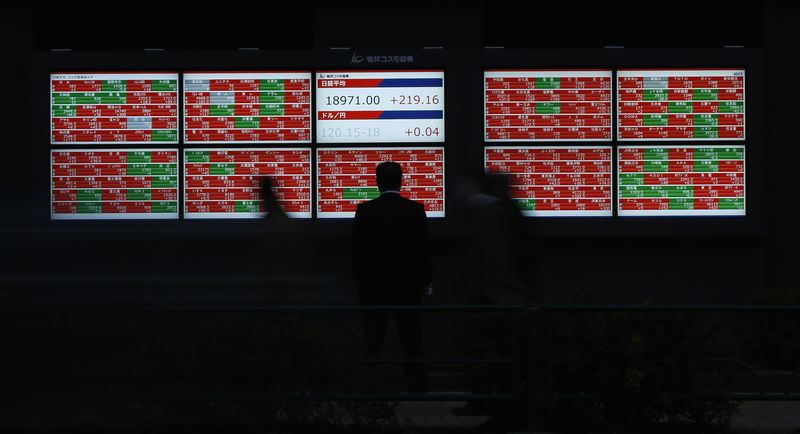By Lisa Twaronite and Hideyuki Sano
TOKYO (Reuters) - A surprise interest rate cut by South Korea's central bank on Thursday helped lift an index of Asian stocks away from the previous session's seven-week trough, while the euro plumbed a new 12-year low as the European Central Bank's easing pressured euro zone bond yields.
Financial spreadbetters predicted some of Asia's lustre would rub off in Europe, with Britain's FTSE 100 (FTSE) seen opening 11 points higher, or up 0.2 percent; Germany's DAX (GDAXI) expected to open 44 points higher, or up 0.4 percent; and France's CAC 40 (FCHI) seen opening 7 points higher, or up 0.1 percent.
"Despite a marginally weaker U.S. session, European traders are shrugging it off and instead focusing on the bullish session in Asia," Jonathan Sudaria, a dealer at Capital Spreads, said in a note.
The Bank of Korea's monetary policy committee cut its base rate
The Bank of Thailand cut its policy interest rate on Wednesday, also a surprise step, and India has cut rates twice this year. China has eased policy twice, with more moves expected, while Singapore, Australia and Indonesia have also eased.
MSCI's broadest index of Asia-Pacific shares outside Japan (MIAPJ0000PUS) extended gains and was up 0.7 percent, moving away from Wednesday's seven-week lows.
The Korea Composite Stock Price Index (KOSPI) (KS11) initially rose, but then fell 0.5 percent. A snap poll conducted by Reuters soon after the decision showed most analysts do not see another rate cut this year.
Japan's Nikkei (N225) ended up 1.4 percent at a 15-year closing high, as traders positioned for Friday's settlement for Nikkei futures and options contracts expiring in March.
"Foreign derivatives investors are seen chasing the market higher," said Norihiro Fujito, senior investment strategist at Mitsubishi UFJ Morgan Stanley (NYSE:MS) Securities, who said investors with long positions in Nikkei futures would like to see futures settle at a higher price.
EURO'S WOES CONTINUE
The euro touched a fresh 12-year low of $1.0494 on Wednesday and was last at $1.0537
The common currency has fallen about 4.8 percent in the past five sessions - a pace of decline not seen even during the European debt crisis of 2011-12.
By contrast, surprisingly strong U.S. employment data published last Friday fuelled expectations that the Federal Reserve may raise interest rates as soon as June, though some investors and analysts fear the economy is not yet ready for even marginally higher borrowing costs.
The monetary policy divergence prompted many market players to shift funds to higher-yielding U.S. dollar from euro.
The dollar index (DXY) <=USD>, which tracks the U.S. currency against a basket of six major rivals, hit a high of 100.06 on Thursday, breaking the 100.000 figure for the first time since April 2003. It was last down about 0.1 percent at 99.672.
The dollar edged down about 0.1 percent against the yen to 121.29
The dollar's strength undermined U.S. shares on Wednesday, on concerns it would erode multinational companies' earnings. The S&P 500 Index (SPX) fell 0.2 percent to a one-month low overnight.
Another downside of the dollar's strength and the spectre of higher U.S. rates is that they risk unsettling the many emerging markets that have benefited from investors seeking higher yielding investments.
Currencies such as the Turkish lira
"We should take note of the risk that emerging currencies could fall further. ... Some emerging countries are running current account deficits and their currencies falling would be negative for risk asset markets," Makoto Noji, senior strategist at SMBC Nikko said in report.
U.S. crude prices

The European benchmark Brent